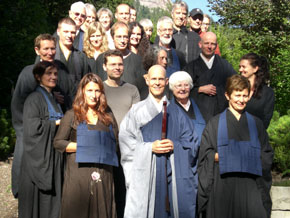Issue 15: Autumn 2011
| Retreat
Report By Mark Øvland |
| The
Sound of Music with One Hand Clapping
As it happens, the timing could not have been more perfect. A fortnight prior to flying out of Heathrow, my karmic consciousness had been holding fast to a story – a story that said the Mahayana was not authentic, that it was mere fancy, a fairytale without basis. The catalyst for change may have been this-or-that book, a meeting with this-or-that person, it doesn’t really matter (and I can’t quite remember!) – but a week later the story had changed; something had shifted, opened. The time had clearly come for my horizon to widen, and with blinkers removed I found myself in a vast new territory, seeing deeply and for the first time the wondrous truths lying at the heart of the Mahayana, and Vajrayana, traditions. And so, with this newly established beginner’s mind, this being open to any possibility, I journeyed to Switzerland: a dry sponge ready and willing to absorb the dharma in whichever form it might present itself. I was ripe for Reb! The smiles and stories of the collected sangha filled the air on the opening day, their shared fondness for each other so evident as eyes met for the first time in a year. And my own smile was to stretch continuously over the following ten or eleven days as I delighted in every little detail: I saw snow-clad peaks scattered across the skyline, felt the charitable tenderness of the moss underfoot, and gazed wonderingly upon the lives of the hundreds of villagers at the toes of the mountain (an auspicious place to hang out I was later to learn!). The scene was idyllic, and the soundtrack the perfect complement – silence intermittently pierced by the ringing of cow-bells and the clunk of the han. I was there to practice though, and in this respect there were two elements of the retreat that were especially new to me: staring at a wall and entertaining so much ritual. As for the first of these, I had made a vow to keep my eyes open during every period of zazen, no matter how tempting it might have been to rest my gaze on the back of my eyelids, the practice to which I was solely accustomed. ‘When in Rome’, I thought. Through the first couple of days my mind questioned the personal efficacy of this style, as I struggled to look at the wall without looking at the wall. But as the mind settled, and my gaze softened, I began to appreciate the qualities of such an approach and above all recognized the inherent beauty in keeping one’s eyes open to the world. It was this enforced acknowledgement of those around me that left the deepest impression on my practice, and I felt genuinely touched by the small formal gestures we each observed around sitting and eating, as we bowed to those beside us. I was not practicing alone, but with and for all beings – this I felt to a degree far greater than I had experienced on any previous retreat. Aside from the bowing to each other, the general formality of the sesshin, with its impeccable services and rituals, struck a chord deep within me. It held everything together, kept the focus sharp, kept the mind tuned in. An aspect of practice I had formally shied away from, I now found myself relishing: it really worked. And then there were the dharma talks! I learnt a great deal from Reb. At the risk of sounding like I came away having grasped his teachings – a cardinal sin, I understand – it must nevertheless be admitted that he made Zen make sense. What had previously seemed so enigmatic and unapproachable I heard effortlessly expounded in a clear and comprehensible way. I left undeniably nourished, and from one teaching in particular. These words have stayed with me, ringing in my ears and in my heart, most days: that to be a Buddha is to be totally ordinary; to realise enlightenment is to be completely oneself. All this said, to separate out as I have the scenery from the form, or the sangha from the teachings, or any one part of the sesshin from any other, is to unnecessarily and unfairly dissect what can only be experienced as a whole. The retreat was perfect and complete, each feature dependent on every other, no element any more significant than the next. I had no idea what to expect from the trip, and there was no way I could have expected what I experienced. It was the perfect introduction to the world of Soto Zen, and for all the conditions that came together to allow this occasion to manifest, I’m eternally grateful. I loved every moment, and left a full and saturated sponge! See you next year? Mark Øvland Back to front page |
 In
June this year I was lucky enough to sit my first sesshin with Reb,
hosted in a picture-perfect temple halfway up a Swiss Alp. However,
what had taken me there was not an interest in Zen – my practice
to that point having been woven quite happily with the threads of
Vedanta and Vipassana – but the wish of a dear friend, a Felsentor
veteran, to accompany her on a pilgrimage to see her teacher. So
what would I make of it?
In
June this year I was lucky enough to sit my first sesshin with Reb,
hosted in a picture-perfect temple halfway up a Swiss Alp. However,
what had taken me there was not an interest in Zen – my practice
to that point having been woven quite happily with the threads of
Vedanta and Vipassana – but the wish of a dear friend, a Felsentor
veteran, to accompany her on a pilgrimage to see her teacher. So
what would I make of it?